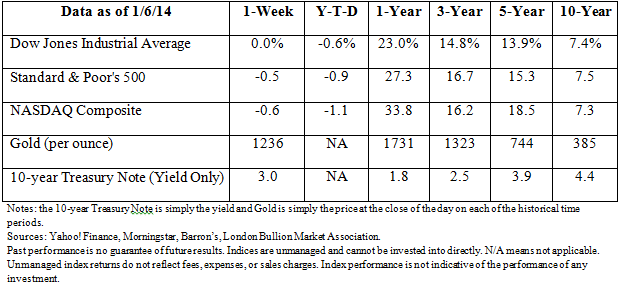The New Year’s New Tax
With another year in the books we can look back at what we hope for you was a terrific 2013. We survived a Government shutdown, Wall Street hit new highs, the United States’ automotive industry turned around, and housing made a strong recovery. When the clock struck 12:00 AM, January 1, 2014, we at Bourke Wealth Management thought about another good year behind us and a great one to come, like most others. However, unlike most, we suspect, we were thinking of what the New Year brought in terms of new taxes.
Don’t be nervous at my mention of tax changes, as most tax related numbers remain unchanged. Income tax rates, for example, remain nearly the same, the only change coming from inflation adjustments.
Capital gains and qualifying dividends also remain the same in 2014. For those with little taxable income, the capital gains tax remains at 0%. For most, the capital gains rate remains at 15% and at its highest, the capital gains tax on collectibles such as gold remains at 28%.
The annual gift tax exemption remains unchanged at $14,000 (married couples $28,000).
Additionally, most retirement plans including 401(k)s, SIMPLE plans, and IRAs all remain unchanged for the new year. The maximum annual deferral for a 401(k) remains at $17,500 per year with a $5,500 catch-up provision for individuals 50 years old and over. SIMPLE plan holders may defer up to $12,000 per year with a $2,500 catch-up and Individual Retirement Accounts still have a $5,500 maximum annual contribution with a $1,000 catch-up provision.
Standard deductions increased slightly for 2014, up between $100 and $200 depending on filing status.
In addition the Alternative Minimum Tax exemption amounts for 2014 rose slightly, generally up a few hundred dollars.
And finally the estate tax exemption did increase from $5.25 million up to $5.34 million.
So what does this mean for you? Although much of the tax laws did not change in 2014, one’s comprehensive tax situation is complex and dynamic. If you want to chat about how these changes might affect you, give us a call.
Amazon Bringing Some Holiday Cheer After Their Christmas Fiasco
Retail monster Amazon, generally known for having almost anything you could want to purchase, put on a glorious display of putting the customer first. Well-known for their Prime Membership, which includes free two-day shipping on thousands of items, Amazon guaranteed delivery before Christmas day if orders were placed by a certain time a few days prior.
Unfortunately, UPS could not deliver on Amazon’s promise, leaving many wondering where their last minute holiday gifts were.
Of course, both companies have come out and apologized for the delay, citing weather and shipping volume issues.
However, going above and beyond expectations and UPS, Amazon refunded all of the affected customers’ shipping fees and sent out $20 gift cards.
Not only did Amazon prove their dedication to client satisfaction, but they set an unprecedented example to large companies: when they could not honor a promise and thereby hurt the customers, they should and did pay, rather handsomely as well.
Although the UPS and Amazon shipping issue nearly stole Christmas, Amazon did their part to really reassure the rest of us that they do care about their customers, and they want to treat them right. This should go for all companies that you frequent, be it a dry cleaner, grocery store or even a financial planner. So I ask, do you feel you are put first when you walk in to your dry cleaner?
The Markets

This newsletter was prepared by Bourke Wealth Management.
P.S. Please feel free to forward this commentary to family, friends, or colleagues. If you would like us to add them to the list, please reply to this e-mail with their e-mail address and we will ask for their permission to be added.
This information is not intended to be a substitute for specific individualized tax advice. We suggest that you discuss your specific tax issues with a qualified tax advisor.
Source of all tax info: www.irs.gov (2 January 2014).
The Standard & Poor’s 500 (S&P 500) is an unmanaged group of securities considered to be representative of the stock market in general.
The 10-year Treasury Note represents debt owed by the United States Treasury to the public. Since the U.S. Government is seen as a risk-free borrower, investors use the 10-year Treasury Note as a benchmark for the long-term bond market.
Gold represents the London afternoon gold price fix as reported by the London Bullion Market Association.
Yahoo! Finance is the source for any reference to the performance of an index between two specific periods.
Opinions expressed are subject to change without notice and are not intended as investment advice or to predict future performance.
Past performance does not guarantee future results.
You cannot invest directly in an index.
Consult your financial professional before making any investment decision.
The opinions voiced in this material are for general information only and are not intended to provide specific advice or recommendations for any individual. To determine which investment(s) may be appropriate for you, consult your financial advisor prior to investing.
Sources:
Barron’s (http://online.barrons.com/home-page)
Bloomberg (https://www.bloomberg.com/)
London Bullion Market Association (http://www.lbma.org.uk/pages/index.cfm)
Morningstar (http://www.morningstar.com/)
Horsesmouth (http://www.horsesmouth.com/ )
Wall Street Journal (http://online.wsj.com/home-page?mg=inert-wsj)
Yahoo! Finance (http://finance.yahoo.com/)


